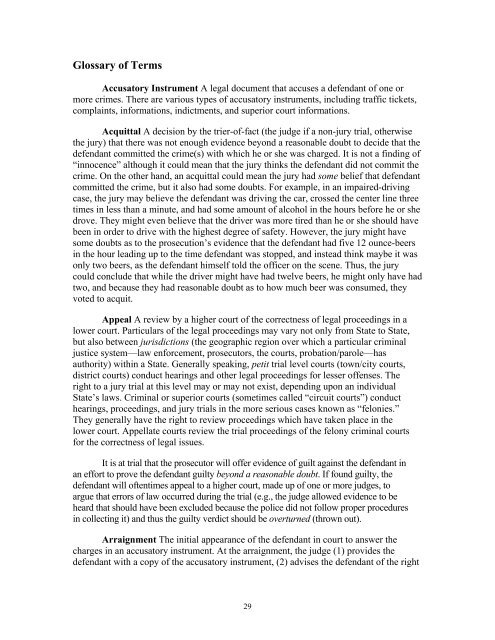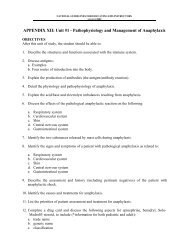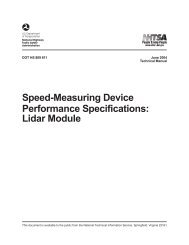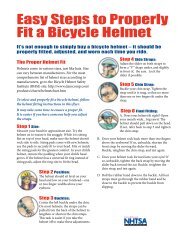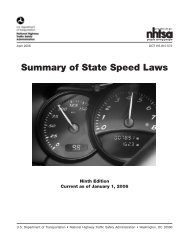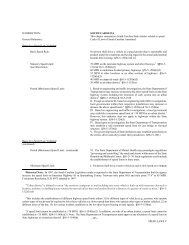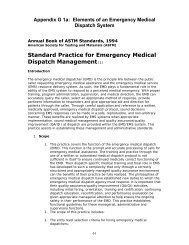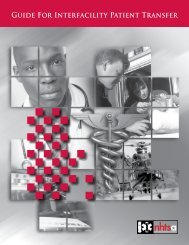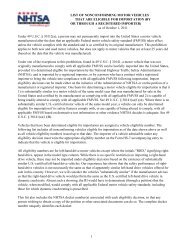The Criminal Justice System: A Guide for Law Enforcement ... - NHTSA
The Criminal Justice System: A Guide for Law Enforcement ... - NHTSA
The Criminal Justice System: A Guide for Law Enforcement ... - NHTSA
Create successful ePaper yourself
Turn your PDF publications into a flip-book with our unique Google optimized e-Paper software.
Glossary of Terms<br />
Accusatory Instrument A legal document that accuses a defendant of one or<br />
more crimes. <strong>The</strong>re are various types of accusatory instruments, including traffic tickets,<br />
complaints, in<strong>for</strong>mations, indictments, and superior court in<strong>for</strong>mations.<br />
Acquittal A decision by the trier-of-fact (the judge if a non-jury trial, otherwise<br />
the jury) that there was not enough evidence beyond a reasonable doubt to decide that the<br />
defendant committed the crime(s) with which he or she was charged. It is not a finding of<br />
“innocence” although it could mean that the jury thinks the defendant did not commit the<br />
crime. On the other hand, an acquittal could mean the jury had some belief that defendant<br />
committed the crime, but it also had some doubts. For example, in an impaired-driving<br />
case, the jury may believe the defendant was driving the car, crossed the center line three<br />
times in less than a minute, and had some amount of alcohol in the hours be<strong>for</strong>e he or she<br />
drove. <strong>The</strong>y might even believe that the driver was more tired than he or she should have<br />
been in order to drive with the highest degree of safety. However, the jury might have<br />
some doubts as to the prosecution’s evidence that the defendant had five 12 ounce-beers<br />
in the hour leading up to the time defendant was stopped, and instead think maybe it was<br />
only two beers, as the defendant himself told the officer on the scene. Thus, the jury<br />
could conclude that while the driver might have had twelve beers, he might only have had<br />
two, and because they had reasonable doubt as to how much beer was consumed, they<br />
voted to acquit.<br />
Appeal A review by a higher court of the correctness of legal proceedings in a<br />
lower court. Particulars of the legal proceedings may vary not only from State to State,<br />
but also between jurisdictions (the geographic region over which a particular criminal<br />
justice system—law en<strong>for</strong>cement, prosecutors, the courts, probation/parole—has<br />
authority) within a State. Generally speaking, petit trial level courts (town/city courts,<br />
district courts) conduct hearings and other legal proceedings <strong>for</strong> lesser offenses. <strong>The</strong><br />
right to a jury trial at this level may or may not exist, depending upon an individual<br />
State’s laws. <strong>Criminal</strong> or superior courts (sometimes called “circuit courts”) conduct<br />
hearings, proceedings, and jury trials in the more serious cases known as “felonies.”<br />
<strong>The</strong>y generally have the right to review proceedings which have taken place in the<br />
lower court. Appellate courts review the trial proceedings of the felony criminal courts<br />
<strong>for</strong> the correctness of legal issues.<br />
It is at trial that the prosecutor will offer evidence of guilt against the defendant in<br />
an ef<strong>for</strong>t to prove the defendant guilty beyond a reasonable doubt. If found guilty, the<br />
defendant will oftentimes appeal to a higher court, made up of one or more judges, to<br />
argue that errors of law occurred during the trial (e.g., the judge allowed evidence to be<br />
heard that should have been excluded because the police did not follow proper procedures<br />
in collecting it) and thus the guilty verdict should be overturned (thrown out).<br />
Arraignment <strong>The</strong> initial appearance of the defendant in court to answer the<br />
charges in an accusatory instrument. At the arraignment, the judge (1) provides the<br />
defendant with a copy of the accusatory instrument, (2) advises the defendant of the right<br />
29


